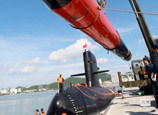
As the champagne bottle smashed onto Henna's bow, onlookers cheered and applauded.
The launch ceremony for China's first luxury cruise ship followed the Western tradition of breaking a bottle for good luck and safe travels. Onboard, I found the crew also had an international flavor: Dancers from Cuba, helmsmen from Norway, service staff from Malaysia. Only a few dozen waitresses were from China.
Although owned by a Chinese company, HNA Tourism Cruise and Yacht Management, there was not much that was Chinese about the ship, inside or out.
It seemed to me there is still a long way to go before this kind of business will mature in China.
The country's cruise industry began in the late 1980s, but no Chinese company had actually entered the market until this month.
"We own the ship, but besides 10 people managing the ship, all the workers on board are managed by Star Cruises," said Zhang Hao, president of HNA Tourism Cruise and Yacht Management.
Having a management team is important for a cruise business, he said.
Henna is the second cruise ship Malaysian waitress Alicia Law has worked on. She said it is "like home", but was concerned about language difficulties.
In mid-January, Tianjin Tourism Bureau signed a contract with the US company Royal Caribbean Cruises to set up China's first training base for cruise workers, which will handle about 100 people a month.
Zhang said he expects HNA's cruise management team will grow from the five members who started in July, to about 200 when it launches its second ship.
It's early days for Henna, as well as China's cruise industry.
Related Readings: China's first luxury cruise liner ready to make waves
















 Buildings collapse after subsidence in S China
Buildings collapse after subsidence in S China


![]()
